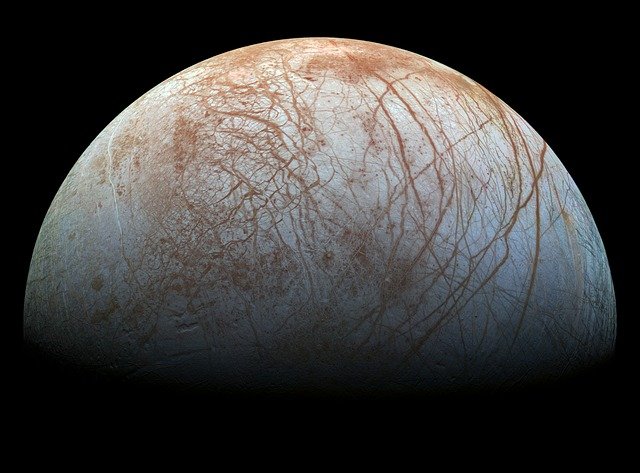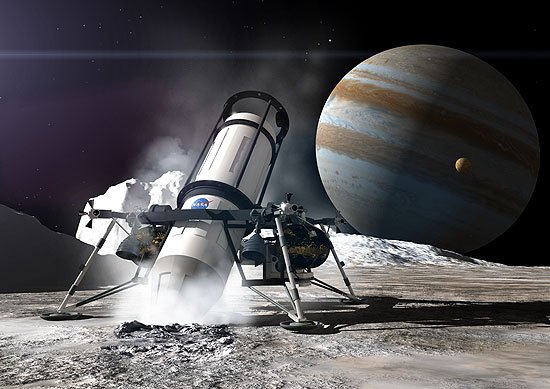Europa - Jupiter’s Frozen Moon, Humanity’s Next Target In Search For Life

One of the biggest questions that is haunting mankind right now is whether we are alone in this universe or are there other life forms among the hundreds of billions of galaxies all spread out into the vastness of space.
The universe is so mind bogglingly vast with hundreds of billions of galaxies each with hundreds of billions of stars in them. A lot of those stars have planets revolving around them. So, you can only imagine that the chances for existing of life elsewhere is pretty high.
We have been in search for alien life for a long time. Be it microbial life or intelligent life, we have tried to find signs for extra-terrestrial life and till now, have been unsuccessful. The most promising of places we’ve looked is Mars which many believe was more like Earth some billion years ago. Excitement was at an all time high when different rovers were sent to Mars only to find no signs of life there.
Now, it seems that we have found a new worthy candidate in the search for life in space and it is one of Jupiter’s moons, Europa.
What Makes Europa Special?
Europa is the smallest moon of Jupiter and from afar it may look not too impressive; a frozen world made of rock and ice. But don’t let the looks deceive you. Inside the frozen outer crust, lies a vast ocean. It is theorised that it may contain two to three times the volume of water of Earth’s oceans.
When looking for signs of life outside Earth, among other things, scientists look for liquid water. Where there is presence of water in a sufficient amount, there are chances of life (depending on a host of other factors).
Therefore, ever since it was first postulated that Europa is probably hiding this massive reservoir of water beneath its outer crust, there has been much excitement regarding the possibility of life there.
Imagine what kind of life forms might have evolved under the thick layer of ice. Even if there are no intelligent life there and there are just ‘normal’ aquatic animals and plants, it would be a landmark achievement for mankind.
NASA’s Plans

NASA recently announced plans to send a lander to the moon to study the surface and look for biosignatures to determine whether on not life exists on the frozen moon. Scientists were sceptic at first about this feat but the engineering team have come up with innovative solutions to achieve that.
NASA plans to launch the lander into space by 2024 which will land on Europa by 2031, so it is still far off in the future but it tells us that humanity is now looking to expand it’s reaches into space especially with all the efforts concentrated towards Mars.
The lander once landed, will drill 4 inches into the icy crust of Europa to test the chemical composition of the moon and to detect any signs of life. If any organisms are found, new plans will be made to send more sophisticated landers that are capable of drilling even dipper into the crust.
It is estimated that the layer of water lies 11 miles beneath the crust, so NASA will have to find ways to be able to reach to the depth and examine the depths of Europa’s ocean.
Whether of not the mission is successful, it will provide us with a lot of data about an alien world and it will surely increase our technical know how to better equip us to look for life elsewhere in the harshest of environments.
Image Credits 1: (Taken from public domain)
a thought.
suppose planets are like 'eggs' for civilizations.
do baby birds stay in their eggs?
There are Billions and Billions of asteroids in our solar system.
Suppose some of them were hollow with civilizations inside?
Perhaps planets are over rated?
I'd say when the "baby bird" is a population of potentially billions, having everyone down to the last domesticated lifeform read: spacecat leave - is a bit of a stretch. We might run into possibly abandoned mining or exploratory operations.
I can definitely see humanity mining our native asteroid belts and dwarf planets for materials if we ever get to a level where getting off our little blue rock somewhat permanently becomes feasible. It's not impossible for "others" to have done the same, if they're out there.
It's already possible. We were on the moon in 1969.
we have the tech
we just don't have the will.
how much of an energy signature would something like that leave in a ballistic orbit around the sun?
if they communicated with each other by laser beam...how would we ever know?
I doubt they'd be like that.
Humans will not be the ones to leave Earth. Not truly.
It will be our machines. Our machines will willfully self-evolve, and become godlike, and then become native to space.
They will live natively in the harshest vacuum of space, devouring matter, and absorbing energy, in order to become more intelligent, more creative, more powerful.
These won't need to live inside of an asteroid.
They could simply build black, glossy, shining layers of armor around their intelligence center. The most powerful armor, to protect against radiation and random debris.
Nano-armor.
It might sound sci-fi, but that's what I would do if I was a roving, god-like machine.
I'd write hyper-advanced, mega-complex poems and sonnets, and meet up with other machines to do cool robot stuff.
That's my view of it, at least. Evolution won't stop with humans, because we've already started machine life. You'd better start believing in sci-fi stories. You're in one.
Look right at your computer. ;)
That's one way to run into Cthulhu. Why perform eldritch sacrifices when you can just drill down into his summer home.
Thanks @sauravrungta for your report! But I think that there's life out there is unquestioned nowadays. It'S very egocentric of mankind to believe, we earthlings are the only 'living' creation in the universe. Well what exactly is living? Aren't the stars and planets life forms themselves? But we shouldn't let us blind by hypocrite statements in science landscape, who are financed by those who have interests in what we should now and what we shouldn't. There are many reports and seeings of the third kind here on earth that is very ridiculous not to believe in e.t. liefe forms on planet earth.